Attention, rope parasites!
Trouble’s brewing in the base camps on K 2 and the neighboring eight-thousander Broad Peak. “I got surprised to see climbers here without ropes.”, writes Mingma Gyalje Sherpa, head of the Nepalese expedition operator Dreamers Destination from the base camp at the foot of K 2, the second highest mountain on earth. Only on the normal route via the Abruzzi spur, three teams are climbing without ropes, says the 31-year-old Nepalese: “If this is how climbers come on K 2, then we can expect (the events of the) year 2008 again on K 2.” At that time eleven climbers from seven nations had died in a true mass summit push on the 8,611-meter-high mountain.
Mingma has agreed with the Austrian expedition organizer Lukas Furtenbach that Dreamers Destination will fix the ropes on the Abruzzi route on K 2 while Furtenbach Adventures will do the same on the normal route on the 8,051-meter-high Broad Peak and later make mutual use of the ropes. Also Furtenbach is hopping mad that other teams neither participate in the work to secure the route nor in the costs.
![]() read more
read more
Fear for Zerain and Galvan
Since Saturday there is no trace of the two top climbers Alberto Zerain and Mariano Galvan on Nanga Parbat. The 55-year-old Spaniard and the 37-year-old Argentinian wanted to climb via the 10-kilometer-long Mazeno Ridge to the 8125-meter-high summit. Last Friday Alberto had spoken on phone with his team. They were doing well and made good progress, said Zerain then. The next day, the signals from the GPS tracker showed that the two were still moving for six hours. After this, the locate point remained on the same spot. Later, the GPS signal ran out.
![]() read more
read more
If the headscarf simply annoys
Donald Trump stands between her and El Capitan. Nasim Eshqi would also like to climb the legendary granite walls in the Yosemite National Park, but the US president has imposed, as is known, an entry ban for Iranians. The 35-year-old from Tehran takes it with humor. “I mean, he is unlucky if I am not there,“ Nasim says, laughing. The female climber does not correspond to the Western cliché of an Iranian woman at all: off-the-shoulder shirt, sunglasses, no headscarf. And she says what she thinks. “The traditional culture in Iran doesn’t accept me or other girls who are the same style like me as real women they want to marry or stay with,” says Nasim. “But it was okay for me from the beginning. I have friends from all over the world who are supporting me mentally.”
![]() read more
read more
Alexander Huber: “Ogre is not a man-eater”
Ogre has on the Huber brothers almost the same effect as the singing of the Sirens in Greek mythology: the two German top climbers can hardly escape the call of this fascinating granite giant. Time and again in their long careers Alexander and Thomas Huber have set off to the Ogre massif in the Karakoram or the nearby peaks of the Latok group. In 1999, they failed in their attempt to climb the 7,285-meter-high Ogre I. Thomas succeeded the second ascent of the mountain in 2001, along with the two Swiss Urs Stoecker and Iwan Wolf. The first ascent was made almost 40 years ago, on 13 July 1977 by the British climbers Chris Bonington and Doug Scott. The descent became a drama with a happy end: Scott broke both ankles, Bonington two ribs. Nevertheless, both of them, supported by the other team members, reached the base camp one week after their summit success – one of the great survival stories on the highest mountains in the world.
Easier doing it with friends
Yesterday Alexander Huber set off to Ogre. His team includes the two East Tyroleans Mario Walder and Christian Zenz and the Swiss Dani Arnold. With Dani (and Thomas Senf), Alexander had opened a new route through the Matterhorn North Face last March. With Mario and Christian, he had succeeded the first ascent of a route on the mountain Ritterknecht in East Greenland in summer 2016. “It’s good to be on the road with partners you know,” says Alexander Huber. His three companions are not only good, competent climbers, but also friends, says the younger of the two Huber brothers. “You have to spend a lot of time together, often moments of tension. The better the human chemistry fits, the better it is.” I talked with the 48-year-old about his expedition before he left for Pakistan.
Alexander, you are heading to Ogre, a seven-thousander in the Karakoram. What exactly are you planning?
![]() read more
read more
Hard times for weather experts
“I’ve got some more gray hair,” said Karl, called “Charly” Gabl. “It was terrible.” The world-famous meteorologist from Austria was talking about the freak weather on Mount Everest during this spring season, which had made predictions as difficult as rarely before. Once again, Charly had pulled numerous all-nighters to advise top climbers from all over the world who trust him almost unconditionally. “The one computer model showed two and a half meters of fresh snow during a week, another one no precipitation. Which one should I take?”
![]() read more
read more
Really on top of Nanga Parbat?
Mingma Gyalje Sherpa is not sure. He can not say with 100 percent certainty that he and his team really reached the 8,125-meter-high summit of Nanga Parbat on 11 June, the 31-year-old Nepalese today writes on Facebook, thus qualifying previous reports on the first summit success of the summer season on the eight-thousanders in Pakistan. He had relied on the local knowledge of a Pakistani climber who had summited the ninth highest mountain on earth in 2005 and with whom he had been on Gasherbrum I and II in 2016, writes Mingma. But the Pakistani had first led the team into a different gully than originally planned. This made the ascent harder and longer, says the Sherpa. When they finally reached the top of a ridge, the Pakistani told them this was the summit. “But that place didn’t look like the summit which I had figured out to be snow and two snow bar(rier)s,“ Mingma writes.
![]() read more
read more
The fast Mingma
He deserves more and more the nickname “The early starter”. While most of the others are still busy setting up their base camps in the Karakoram, Mingma Gyalje Sherpa, head of the Nepalese expedition operator, Dreamers Destination, already last Sunday led a team to the 8125-meter-high summit of Nanga Parbat. The success on the ninth highest mountain on earth was the first of this summer season on the eight-thousanders in Pakistan. Also in the past spring season in Nepal and Tibet, Mingma had achieved the first 8000er summit success: On 30 April, the 31-year-old reached along with his team the summit of the 8167-meter-high Dhaulagiri. Not even two weeks later he stood with Tashi Sherpa and a client from China on the 8485-meter-high main summit of Makalu – also on this peak, Mingma was the first this spring.
![]() read more
read more
Kammerlander: “I want to finish my path on Manaslu”
He wants to draw a final line. Late next fall, the South Tyrolean Hans Kammerlander wants to climb the 8163-meter-high Manaslu in Nepal, leaving his trauma of 1991 behind. During a summit attempt, his two friends Friedl Mutschlechner and Karl Großrubatscher had died in a thunderstorm. At that time Kammerlander declared that he would never return to Manaslu. In the years before, Hans, at the side of Reinhold Messner, had written alpine history. Thus the two succeeded the first eight-thousander double traverse on Gasherbrum I and II in Pakistan in 1984 – in Alpine style.
“No alpinism”
Kammerlander has so far climbed twelve of the 14 eight-thousanders. In 1996, he skied down from the summit of Mount Everest via the Tibetan north side. Hans, however, had to take off his skies several times because it was a season with little snow. Meanwhile the 60-year-old has lost any interest in what happens on Everest. “I’m not following this. For me normal Everest ascents have nothing to do with alpinism. Supplemental oxygen, prepared mountains and the Sherpas make everything clear,” the 60-year-old told me. “But everyone should do it as he thinks it’s right. But he should leave no garbage there. He has to leave the mountain clean, then it’s okay for me.” I spoke to Kammerlander about his upcoming Manaslu project, which he wants to realize along with the North Tyrolean mountain guide Stephan Keck.
Hans, Manaslu means “mountain of the spirit”. Does Manaslu still weigh heavily on you?
![]() read more
read more
Once upon a time … the Hillary Step
The big boulder is gone. This is for sure. Tim Mosedale, a six-time Everest summiter from the UK, has added some pictures to Facebook to support his statement that the Hillary Step, the striking twelve-meter-high rock at 8,790 meters, no longer exists in its previous form. Tim’s pictures show: Where once a mighty boulder represented the last serious challenge before the summit, now only a few chunks are lying around. The British expedition leader had already claimed this in mid-May after his successful summit attempt: “It’s official. The Hillary Step is no more.”
![]() read more
read more
Nives Meroi: “Do it with patience and passion!”
There are mountaineers who in particular deserve their successes. Like Nives Meroi and Romano Benet from Italy. Without making a fuss about it, the two 55-year-olds have scaled eight-thousander after eight-thousander over the years and have remained true to themselves and their style: always en route in a small team, without Sherpa support, not using bottled oxygen. With the ascent of Annapurna, Nives and Romano completed their eight-thousander collection, exactly a month ago today – 19 years after their first success on Nanga Parbat, eight years after Romano suffered from aplastic anemia. Two bone marrow transplants were necessary to save Romano’s life.
Along with two Spaniards and two Chileans, Meroi and Benet reached the 8091-meter-high summit of Annapurna on 11 May. They became the first married couple who scaled all of the 14 highest mountains in the world. Nives was the second woman after the Austrian Gerlinde Kaltenbrunner, who stood on all eight-thousanders without breathing mask. Meanwhile, Nives and Romano are back in Italy – and Nives has answered my questions, which I had sent to the couple after their success on Annapurna.
It was your third attempt on Annapurna after 2006 and 2009. How did you experience your climb? Did you benefit from your previous attempts?
![]() read more
read more
China cancels fall season on Tibet’s eight-thousanders
This was not a good week for Janusz Adamski. First, the Nepalese government seized his passport and informed the Pole that he would be not allowed to enter Nepal for mountaineering in the next ten years. And now, the Chinese authorities made the 48-year-old the scapegoat for not issuing any permits next fall for the three eight-thousanders in Tibet. Adamski, who “illegally” scaled Mount Everest from the north side and then traversed to the south side on 21 May, was responsible that the rules and regulations had to be “adjusted and improved”, informed the China Tibet Mountaineering Association (CTMA). To ensure that the problems were solved in time by 2018, there would be no climbing permits for fall 2017, said the CTMA.
![]() read more
read more
Everest season: successes, records, deaths and more
If a mountain could breathe a sight of relief, Mount Everest would probably do it now. A total of more than 1,000 climbers on both sides of the highest mountain on earth have left the base camps and have returned home. There is silence again on Chomolungma, as the Sherpas call the mountain. Time to take stock. The exact figures are not yet available, but this spring some 600 summit successes have been recorded, increasing the number since the first ascent in 1953 to more than 8000.
![]() read more
read more
Felix Berg: “Extremely spontaneous expedition”
Unpredictability is an essential part of adventure. And the more ambitious a mountain project, the greater is the uncertainty as to whether it really ends with a success. Thus the Italians Tamara Lunger and Simone Moro, who had planned to traverse the four summits of the Kangchenjunga massif without bottled oxygen, had to turn back without having reached a single summit. Two attempts ended at 7,200 meters, because Simone suffered from stomach ache. The German Thomas Laemmle returned empty-handed from Makalu, after four (!) failed summit attempts without supplemental oxygen and Sherpa support, always forced back by bad weather. And on the Northwest Face of Annapurna, the 33-year-old Pole Adam Bielecki, the 63-year-old Briton Rick Allen and the 36-year-old German Felix Berg had to capitulate halfway. “It was completely the right decision to turn around,” Felix tells me. “On the day of our descent, there was heavy snowfall. It would not have been possible with the weather.”
![]() read more
read more
Hans Wenzl: “All alone on top of Everest”
He had to push himself to his limits. Last Saturday, the Austrian Hans Wenzl – as reported before – reached the highest point on earth at 8,850 meters, despite adverse weather conditions, ascending from the Nepali south side without bottled oxygen. Mount Everest was already the eighth eight-thousander which Hans summited without breathing mask. He previously had stood on top of Broad Peak, Nanga Parbat, Gasherbrum I and II, Manaslu, Cho Oyu and Makalu. In addition, he reached in 2005 the 8,008-meter-high Central Peak of Shishapangma which is 19 meters lower than the Main Summit. His long-term goal is to complete the eight-thousander collection without supplemental oxygen. Even though the 46-year-old is not a professional climber. Wenzl earns his living as a site foreman of an Austrian construction company. For his expeditions he has to take holiday. Hans lives in the village of Metnitz in the north of Carinthia. He and his wife Sonja have two adult sons. He replied to my questions, which I had sent him to Nepal.
![]() read more
read more
On the short rope?
It is undisputed that Adrian Ballinger reached the summit of Mount Everest without bottled oxygen last Saturday. But a debate rose about how he did it. The trigger was my article about a conversation with Ralf Dujmovits on Monday, two days after his failed attempt without breathing mask on the north side of Everest at an altitude of 8,580 meters. During the satellite phone call, the 55-year-old German climber had accused Ballinger that the American had reported about his ascent in real time via the social networks, but had not mentioned some facts. On the descent, for example, Adrian had been led by an Ecuadorian mountain guide on the short rope, said Ralf. Ballinger’s team responded promptly.
![]() read more
read more



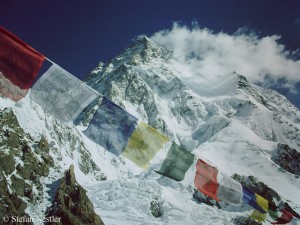

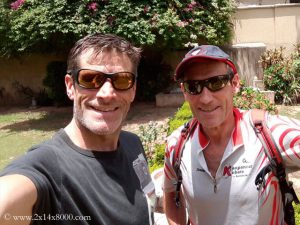

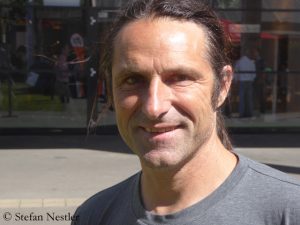

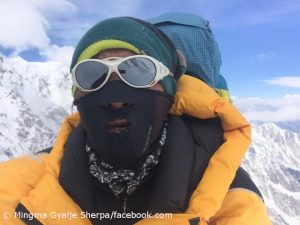


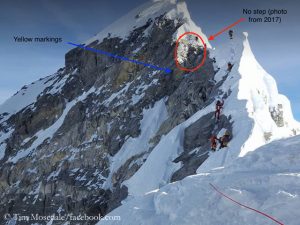

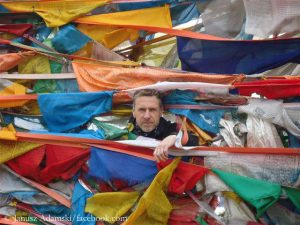
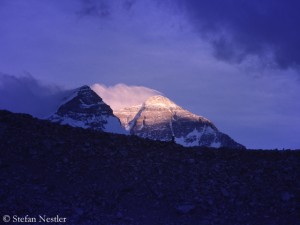
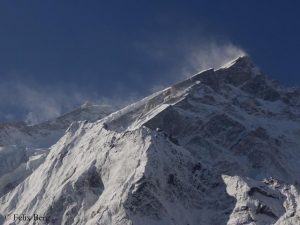
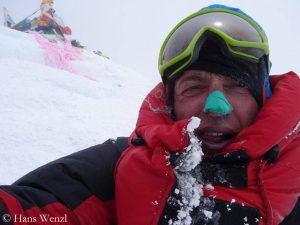
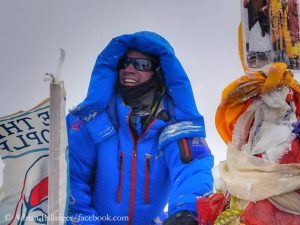




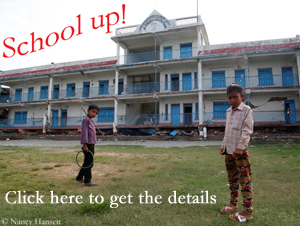
Feedback